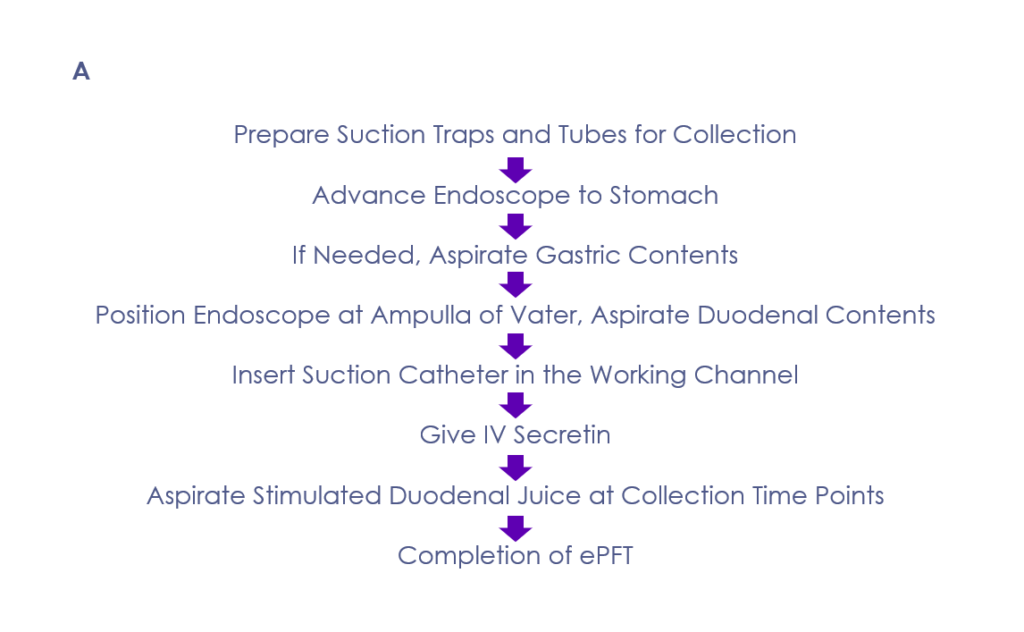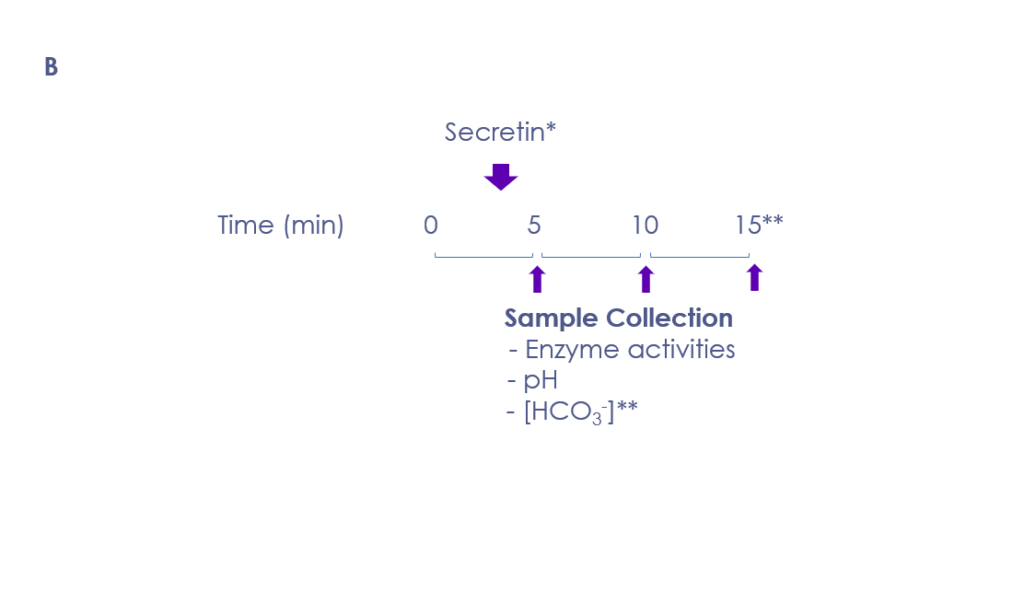May/June 2023 Newsletter
Pediatric Pancreatitis
Pediatric Endoscopic Pancreatic Function Test
When conditions like abdominal pain, bloating, chronic diarrhea, weight loss, and generalized failure to thrive occur in the pediatric population, it is important to consider exocrine pancreatic insufficiency (EPI). There is a need for a sensitive and accurate test to be performed in the pediatric population for diagnosing EPI. The short endoscopic pancreatic function test (ePFT) assesses enzyme secretions in pediatrics.
June Highlight: Secretin Stimulated Endoscopic Pancreatic Function Test
This month, we’re highlighting how ChiRhoStim can be used in conjunction with endoscopic pancreatic function testing (ePFT) as a valuable test for diagnosing EPI. Secretin-endoscopic pancreatic function test (S-ePFT) is a safe procedure in pediatrics, that can be performed when doing an esophagogastroduodenoscopy (EGD).
S-ePFT and EPI Diagnosis
Endoscopic pancreatic function testing (ePFT) is one way to directly assess EPI. Common indications for pancreatic function testing in children are listed in Table 1. An example of the S-ePFT is detailed in Figure 1. Protocol may vary by institution.
TABLE 1. Common indications for pancreatic function testing (all methods) in children |
|---|
| 1) Evaluate for EPI in patients with steatorrhea, chronic diarrhea, or failure to thrive. 2) Define the extent of pancreatic function in patients with cystic fibrosis. 3) Rule out CP in patients with inconclusive imaging findings or, with discretion, in children with unremitting, chronic abdominal pain. 4) Differentiate hepatic, brush border/intestinal luminal, and brush birder etiologies of fat malabsorption form exocrine pancreatic etiologies. 5) Assessment for specific isolated/individual pancreatic enzyme deficiencies. |
| CP = chronic pancreatitis |
Figure 1


Potential differences in the kinetics of enzyme secretion, pH, and bicarbonate secretion between secretin and CCK administration may alter time course of study. Additional time periods may be necessary if measuring bicarbonate secretion.
| Supplies Needed |
|---|
| 1. Endoscope. 2. Sterile suction catheter that will fit in endoscope working channel (e.g. 5-4-3 ERCP catheter). 3. Suction traps for every time point, with corresponding label. Ice bucket with labeled collection tubes (every time point) |
| Procedure |
|---|
| 1. Place patient in the left lateral decubitus position, or supine if preferred. 2. Advance endoscope to stomach and if needed aspirate stomach contents. A water flush with subsequent aspiration may be necessary based on stomach contents. 3. Advance the endoscope to the 2nd portion of the duodenum, approximating the Ampulla of Vater. 4. Insert the suction catheter (e.g. 5-4-3 ERCP catheter) into the working channel of the endoscope and advance the lumen of the duodenum. If a suction catheter cannot be used, direct suction through the working channel can be performed with care to prevent contamination with gastric contents. 5. Suction out any existing duodenal contents. 6. Remove the original suction trap and replace with the “5 Minutes” suction trap inline with the endoscopic suction line. 7. Give secretin (0.2 μg/kg) or CCK (0.04μg/kg) via IV bolus and start timer. 8. Periodically suction duodenal juice via suction catheter and collect for 5 minutes. 9. Change suction trap, saving duodenal juice on ice.1 Replace with the “10 Minutes” suction trap and repeat Step 8. 10. Repeat steps 8 and 9 until you have collected the last sample. 11. Remove endoscope and/or proceed with endoscopy per routine. 12. Send all collected samples for pH/enzyme and/or bicarbonate concentration analysis. |
| 1 If measuring bicarbonate concentration, remove an aliquot of fluid to be placed in a well-sealed tube in order to send to chemistry lab. Note: you may need to make a notation to the laboratory that dilution may be necessary to ensure proper readout within range of analyzer. * Potential differences in the kinetics of enzyme secretion, pH, and bicarbonate secretion between secretin and CCK administration may alter time course of study. ** Additional time periods may be necessary if measuring bicarbonate concentration. |
Conference Summary



Pancreas Club Annual Meeting | Palmer House Hilton Chicago | Chicago, IL
The sense of fellowship and camaraderie is engendered by the insight and helpful feedback generated from pancreas experts worldwide. ChiRhoClin was a proud sponsor at this years meeting, where collaboration amongst pancreas specialists worldwide is both encouraged and fostered, and we will continue to support their educational efforts in the years to come.
DDW Annual Meeting | McCormick Place Convention Center Chicago | Chicago, IL
ChiRhoClin exhibited again this year at DDW, where we were surrounded some of the best and brightest in the field of digestive diseases. From riveting poster session to the variety in session topics and the exhibit hall offering the latest and greatest technologies, methods, and innovations in digestive diseases, DDW once again delivered and ChiRhoClin is excited to see what the future holds in next years annual event in Washington D.C.
Society for Pediatric Radiology 2023 Annual Meeting & Postgraduate Course | Hilton Austin, TX
In the 66th Anniversary of the SPR Annual Meeting & Postgraduate Course, ChiRhoClin was invited to “Remember the Past and Prepare for the Future” of Pediatric Radiology. The meeting brought the pediatric radiology community together share state-of-the-art pediatric imaging and its positive impact on the young patients served. We were happy to exhibit ChiRhoStim® and the ways our product can help the pediatric patient population.
Future Conferences
July 27-28
PancreasFest | University of Pittsburgh and the William Penn Student Union Building | Pittsburgh, PA
Contact Wade Schoenecker for more information on where to find us!
